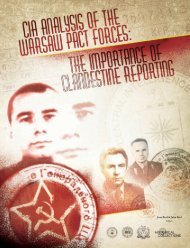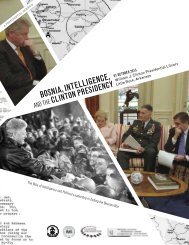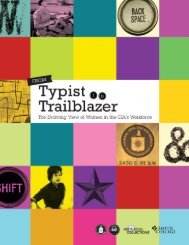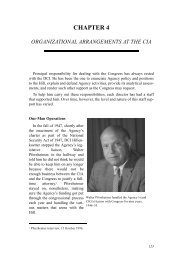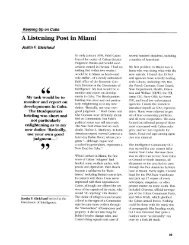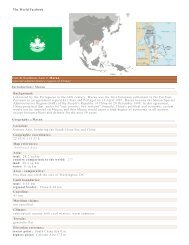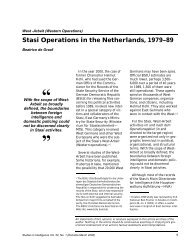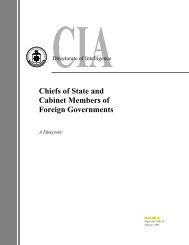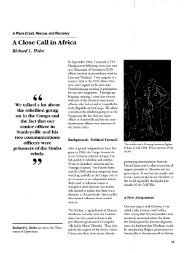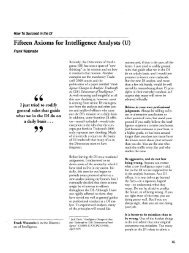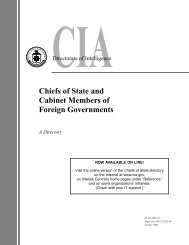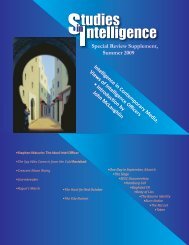Analytic Culture in the U.S. Intelligence Community (PDF) - CIA
Analytic Culture in the U.S. Intelligence Community (PDF) - CIA
Analytic Culture in the U.S. Intelligence Community (PDF) - CIA
You also want an ePaper? Increase the reach of your titles
YUMPU automatically turns print PDFs into web optimized ePapers that Google loves.
INTRODUCTION<br />
In August 2001, I accepted a Director of Central <strong>Intelligence</strong> postdoctoral<br />
research fellowship with <strong>the</strong> Center for <strong>the</strong> Study of <strong>Intelligence</strong> (CSI) at <strong>the</strong><br />
Central <strong>Intelligence</strong> Agency. The purpose of <strong>the</strong> fellowship, which was to<br />
beg<strong>in</strong> <strong>in</strong> September and last for two years, was to identify and describe conditions<br />
and variables that negatively affect <strong>in</strong>telligence analysis. Dur<strong>in</strong>g that<br />
time, I was to <strong>in</strong>vestigate analytic culture, methodology, error, and failure<br />
with<strong>in</strong> <strong>the</strong> <strong>Intelligence</strong> <strong>Community</strong> us<strong>in</strong>g an applied anthropological methodology<br />
that would <strong>in</strong>clude <strong>in</strong>terviews (thus far, <strong>the</strong>re have been 489), direct and<br />
participant observation, and focus groups.<br />
I began work on this project four days after <strong>the</strong> attack of 11 September, and<br />
its profound effect on <strong>the</strong> professionals <strong>in</strong> <strong>the</strong> <strong>Intelligence</strong> <strong>Community</strong> was<br />
clearly apparent. As a whole, <strong>the</strong> people I <strong>in</strong>terviewed and observed were<br />
patriotic without pageantry or fanfare, <strong>in</strong>telligent, hard work<strong>in</strong>g, proud of <strong>the</strong>ir<br />
profession, and angry. They were angry about <strong>the</strong> attack and that <strong>the</strong> militant<br />
Islamic <strong>in</strong>surgency about which <strong>the</strong>y had been warn<strong>in</strong>g policymakers for<br />
years had murdered close to 3,000 people <strong>in</strong> <strong>the</strong> United States itself. There<br />
was also a sense of guilt that <strong>the</strong> attack had happened on <strong>the</strong>ir watch and that<br />
<strong>the</strong>y had not been able to stop it.<br />
Hav<strong>in</strong>g occurred under <strong>the</strong> dark shadow of that attack, this study has no<br />
comparable basel<strong>in</strong>e aga<strong>in</strong>st which its results could be tested, and it is difficult<br />
to identify biases that might exist <strong>in</strong> <strong>the</strong>se data as a result of 11 September. In<br />
some ways, post-9/11 data may be questionable. For example, angry people<br />
may have an ax to gr<strong>in</strong>d or an agenda to push and may not give <strong>the</strong> most reliable<br />
<strong>in</strong>terviews. Yet, <strong>in</strong> o<strong>the</strong>r ways, post-9/11 data may be more accurate.<br />
When people become angry enough, <strong>the</strong>y tend to blurt out <strong>the</strong> truth—or, at<br />
least, <strong>the</strong>ir perception of <strong>the</strong> truth. The people I encountered were, <strong>in</strong> my judgxiii



